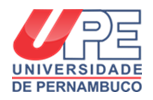Eventos
DEFESA DE DISSERTAÇÃO DE MESTRADO Nº293
Aluna: Pamella Letícia Silva de Oliveira
Título: “Desenvolvimento de uma Interface para Visualização de Perfis de Engajamento Criados a partir de Agrupamento de Dado"
Orientador: Alexandre Magno Andrade Maciel - (PPGEC)
Coorientador: Rodrigo Lins Rodrigues - (UFRPE)
Examinador Externo: Jorge Luis Cavalcanti Ramos - (Univasf)
Examinador Interno: Raphael Augusto de Sousa Dourado - (PPGEC)
Data-hora: 29 de fevereiro de 2024, às 14:30h.
Local: Formato Presencial, Sala i4.
Resumo:
A Educação a Distância (EaD) vem sendo adotada por estudantes de vários países, devido a flexibilidade de horário, maior acesso geográfico entre outros benefícios. Entretanto, essa modalidade de ensino possue um baixo índice de concluintes. Diante disso, analisar o engajamento desses alunos torna-se essencial para os professores identificar os alunos com risco de reprovação ou desistência. Entretanto, diante do grande número de aluno na turma fica inviável para os professores realizar esse acompanhamento. Por isso, a literatura apresenta paíneis educacionais, entretanto, muitos deles foram desenvolvidos sem nenhuma avaliação com os usuários, gerando gráficos confusos e difíceis de interpretar. Diante desse contexto, o presente trabalho tem como principal objetivo o desenvolvimento de metáforas de visualizações para o acompanhameno do engajamento em ambientes EaD. Que será desenvolvido por meio das etapas de Design Science Research (DSR), com a primeira etapa onde a consciência do problema será investigado por meio de uma Revisão Sistemática da Literatura e entrevista com professores do EaD. A segunda etapa, a escolha das variáveis de engajamento e das metáforas de visualizações, bem como, a análise e o desenvolvimento das mesmas. Por fim, para garantir que o painel contempla as necessidades dos professores EaD, bem como, atende aos critérios de usabilidade será realizado avaliações com professores e com especialista. Podem ser elencados como os principais benefícios desta implementação: 1) o desenvolvimento de um painel composto por visualizações corretas e de fácil entendimento ,apresentadas em conjunto, para auxiliar os professores no acompanhamento do engajamento dos alunos; 2) a importância de analisar qual melhor visualização e como fazer essa análise; 3) a relação de características que os paíneis devem seguir para garantir maior usabilidade para os usuários.

DEFESA DE DISSERTAÇÃO DE MESTRADO Nº 292
Aluno: Filipe Tabosa da Silva
Título: “Técnica Technical Debt: Priorização baseada em critérios de médio e longo prazo"
Orientador: Wylliams Barbosa Santos - (PPGEC)
Orientador: Rodrigo Rebouças de Almeida
Examinador Externo: Jose Adson Oliveira Guedes da Cunha (UFPB)
Examinador Interno: Carlo Marcelo Revoredo da Silva - (PPGEC)
Data-hora: 27 de Fevereiro de 2024, às 14:30h.
Local: Formato Remoto - Google Meet.
Resumo:
Contexto: Dívida Técnica é um termo criado para referir-se às soluções de baixa qualidade que promovem um benefício imediato, mas que precisam ser resolvidas posteriormente para evitar prejuízos ao projeto. Problema: O cenário de dívidas técnicas de um projeto pode ter um volume que inviabilize o pagamento de todos os seus itens. A priorização é um fator importante para direcionar o foco sobre as dívidas que trazem maior risco de danos. Objetivo: Identificar as causas que influenciam na tomada de decisão para priorizar itens de dívida técnica com base em critérios de médio e longo prazo. A fim de gerar conhecimento para que profissionais melhorem a tomada de decisão na priorização e gestão de dívida técnica, bem como gerar insights e contribuir para a evolução do framework Tracy TD. Método: Houve inicialmente a replicação de um Estudo de Caso para avaliação de um modelo de priorização de dívidas técnicas, executado em formato de colaboração indústria-academia, com o intuito de propiciar um aprofundamento no tema e busca de um problema relevante no contexto de priorização de dívidas técnicas. Após ser identificado o gap de pesquisa, foram realizadas entrevistas semiestruturadas com profissionais da indústria que atuam em diferentes empresas. Estimulando o compartilhamento de experiências e cenários que envolvem a tomada de decisão para priorização das dívidas técnicas, que proporcionou uma Análise Temática para extrair as respostas para as perguntas de pesquisa. Resultados: Com o processo aplicado foi possível esclarecer: (i) critérios de médio e longo prazo que influenciam na priorização de dívidas técnicas; e (ii) tipos de dívidas técnicas mais afetados pelos critérios de médio e longo prazo. Durante a pesquisa foram obtidos aceites e publicações relevantes. Além de estimular e praticar a execução de pesquisa em ambiente real da indústria, através da colaboração indústria-academia. Conclusão: A análise dos resultados esclareceu como a priorização de dívidas técnicas é realizada com base em critérios de médio e longo prazo. Quais são as variáveis consideradas e os tipos de dívida mais afetados por tais critérios. Gerando contribuições teóricas para a academia e práticas para profissionais.

DEFESA DE DISSERTAÇÃO DE MESTRADO Nº 291
Aluno: Islan Amorim Bezerra
Título: “Técnica de Machine Learning para a Recuperação Eficiente de Dados Formatados em Imagens JPEG e PNG"
Orientador: Sidney Marlon Lopes de Lima - (PPGEC)
Examinador Externo: Waldemar Pires Ferreira Neto - (UFRPE)
Examinador Interno: Sérgio Murilo Maciel Fernandes - (PPGEC)
Data-hora: 23 de Fevereiro de 2024, às 17:00h.
Local: Formato Remoto - Google Meet.
Resumo:
Com efeito colateral da massificação da rede mundial de computadores, os crimes virtuais têm uma maior tendência de ocorrer. As situações rotineiras são: cyberbullying e compartilhamentos ilícitos, mas também ocorrem casos de invasão de privacidade, divulgação de mensagens difamatórias e pornografia infantil. Como agravante, quando o equipamento digital é roubado, perdido ou descartado, os dados continuam armazenados no dispositivo de armazenamento em massa. Esse fator permite a recuperação de arquivos formatados. Porém quando empregada de forma lícita, a recuperação de dados formatados é capaz contribuir com as investigações de crimes digitais e cibernéticos. O presente trabalho visa o resgate de arquivos formatados. É investigada a aplicabilidade das ferramentas Foremost, Scalpel e Magic Rescue no ambiente Linux. Adicionalmente, é criada uma ferramenta autoral, patenteada como Dejavu Forensics, dotada de ciência dos dados, machine learning e reconhecimento de padrão estatístico. A Dejavu Forensics traz novas percepções de análise com relação aos métodos de recuperação de arquivos formatados. Na ferramenta proposta, o cluster da partição é empregado como atributo de entrada da máquina de aprendizado estatística. Visa-se reconhecer o padrão dos blocos/clusters do tipo de arquivo a ser recuperado, em tempo de execução. No primeiro cenário, aqui denominado "simples", a classificação é binária. Há apenas classe vs. contra-classe. Essa metodologia foi desenvolvida por Pavel (2017) e replicada no cenário simples mencionado anteriormente. Em um segundo cenário, denominado "complexo", foi utilizado o método um contra todos, cujo banco de dados contém 16.000 arquivos. A Dejavu Forensics apresenta uma abordagem de ponta que sinergiza o aprendizado de máquina e a ciência de dados para recuperar dados formatados. A ferramenta inovadora apresenta uma taxa de recuperação notável de mais de 96% para arquivos PNG e JPEG formatados, executada em apenas alguns segundos. Esse avanço é uma promessa significativa de modo a otimizar as investigações forenses digitais. As experiências relatadas no trabalho proposto deixam contribuições para o avanço nos estudos sobre recuperação de dados. Sua relevância diz respeito à proposta de auxiliar na elucidação dos crimes digitais que rondam a sociedade contemporânea. O sistema autoral se torna um locus de como a tecnologia pode servir aos direitos humanos e melhorar a qualidade de vida na sociedade contemporânea.



